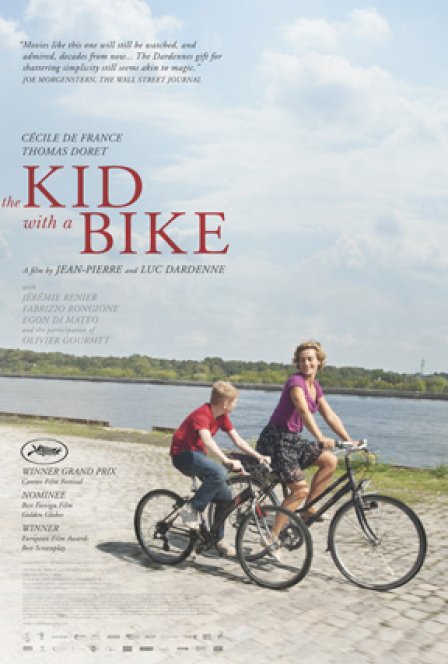There’s a moment growing up when you first start to encounter the world on your own. You exist in it, alone, and try to get a grasp, a sense of its rhythms. Initially, this is always only ever a small disaster; there’s so much to learn and far too many ready to take advantage of your greenness. These first few solitary encounters can broadly shape one’s entire outlook. In The Kid With a Bike, the Dardenne brothers explore one boy’s first approaches with the world at large. They handle the task with thoughtfulness and deliberation, creating an excellent study in pre-teen growth and confusion.
Cyril’s father has abandoned him, and his mother’s whereabouts aren’t addressed. At 11, Cyril (Thomas Doret) refuses to believe his father has left and insists that his bike is still at their apartment; his father, he thinks, wouldn’t have been able to stomach selling his most precious possession. Cyril abandons his obligations whenever possible, scampering into town to his father’s old apartment, trying repeatedly to prove that his father hasn’t gone anywhere. At one point, he physically latches himself to a woman waiting in a clinic in order to not to be brought back to school. Adults never treat him cruelly, but coming to terms with his father’s betrayal requires insurmountable denial and an insistence that all adults serve as Cyril’s opposition. The woman Cyril clung to in the clinic eventually appears at school; she found his bike and paid to get it back. Soon Cyril is spending weekends with Samantha (Cécile de France), riding his bike around town as he begins to learn how to interact with quotidian suburban life. Samantha and Cyril’s growing trust becomes the film’s new focus, as the boy approaches her care with skepticism and she approaches her newfound responsibility with insecurity and caution.
Cyril is a fascinating character, forthright and independent while also afraid and confused. He postures more confidently than his peers, and his stubbornness gets him disciplined repeatedly. He quickly locates his father, who cops to simply being unable to handle his responsibilities as a father: he just can’t be a dad right now. The Dardennes are fanatically straightforward throughout the film — there is no complicated storytelling, and their characters simply say what they mean. In many ways, the film is simply an analytical study of growing up, a bildungsroman delivered in five neat little chapters, each with the same orchestral flourish (the film’s only non-diegetic sound) signaling its close. Despite this artifice, however, they’ve managed to construct an honest, powerful examination of adolescence at its most vulnerable. Cyril is frightened and friendless, and watching him approach his peers is fascinating. He falls in with troublemakers, but Doret does a shockingly masterful job of showcasing the moral battle within Cyril as he drifts between his guilt and the inevitable lure of community. The neatest analog for Cyril is Truffaut’s youngest version of Antoine Doinel. But where Truffaut wanted rebellion, the Dardennes want only comfort and healthy growth for their troubled lad.
After coming to terms with his father, Cyril lets his aggression cause him to fall in with some local roughs. He starts hanging with an older kid who invites him over for Xbox and soda. Eventually, Cyril agrees to help this thug attack and rob a local newsstand owner. There’s a darkness to everything that follows; a man is injured, and Cyril’s new mentor abandons him, foisting the crime into Cyril’s lap. What happens next is both encouraging and elegantly told. Cyril has to reckon with the law, and though the financial issues are resolved, the newsstand owner’s son refuses to let go of Cyril’s crime. The film becomes a testament to forgiveness, an acknowledgement of how fundamentally futile aggression and mistrust can be.
With The Kid With a Bike, the Dardenne brothers have delivered an elegant film, one about a child’s first encounters with both abandonment and acceptance, a story of trust lost and regained. They have wrung flawless performances from both their stars and have managed to tell their story within the microcosm of a simple Belgian village. Watching Cyril shift from little terror to promising youth is eminently joyful. Cyril’s adventures are simple, powerful, and moving, resulting in incredibly direct and honest filmmaking.

